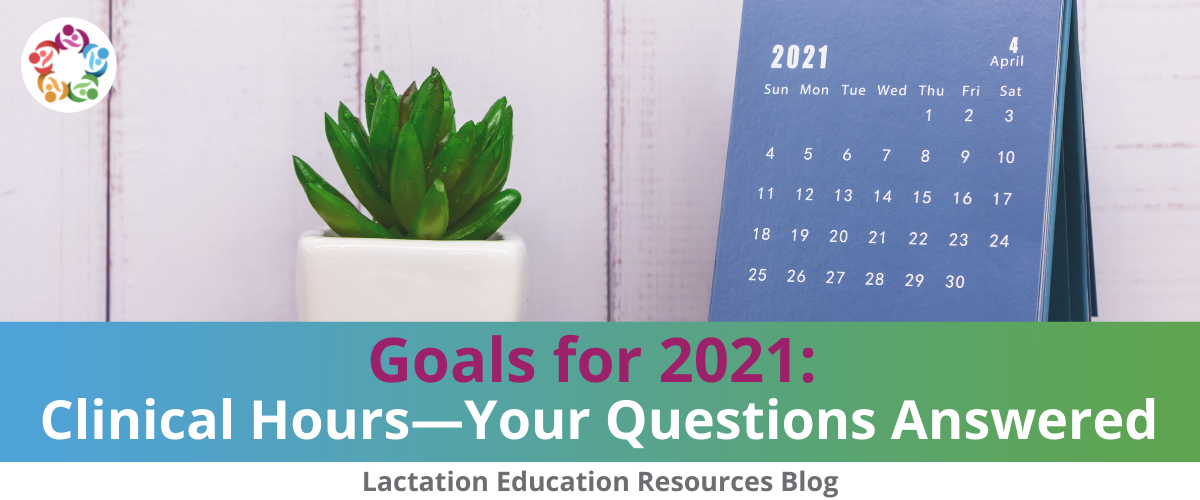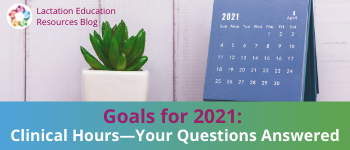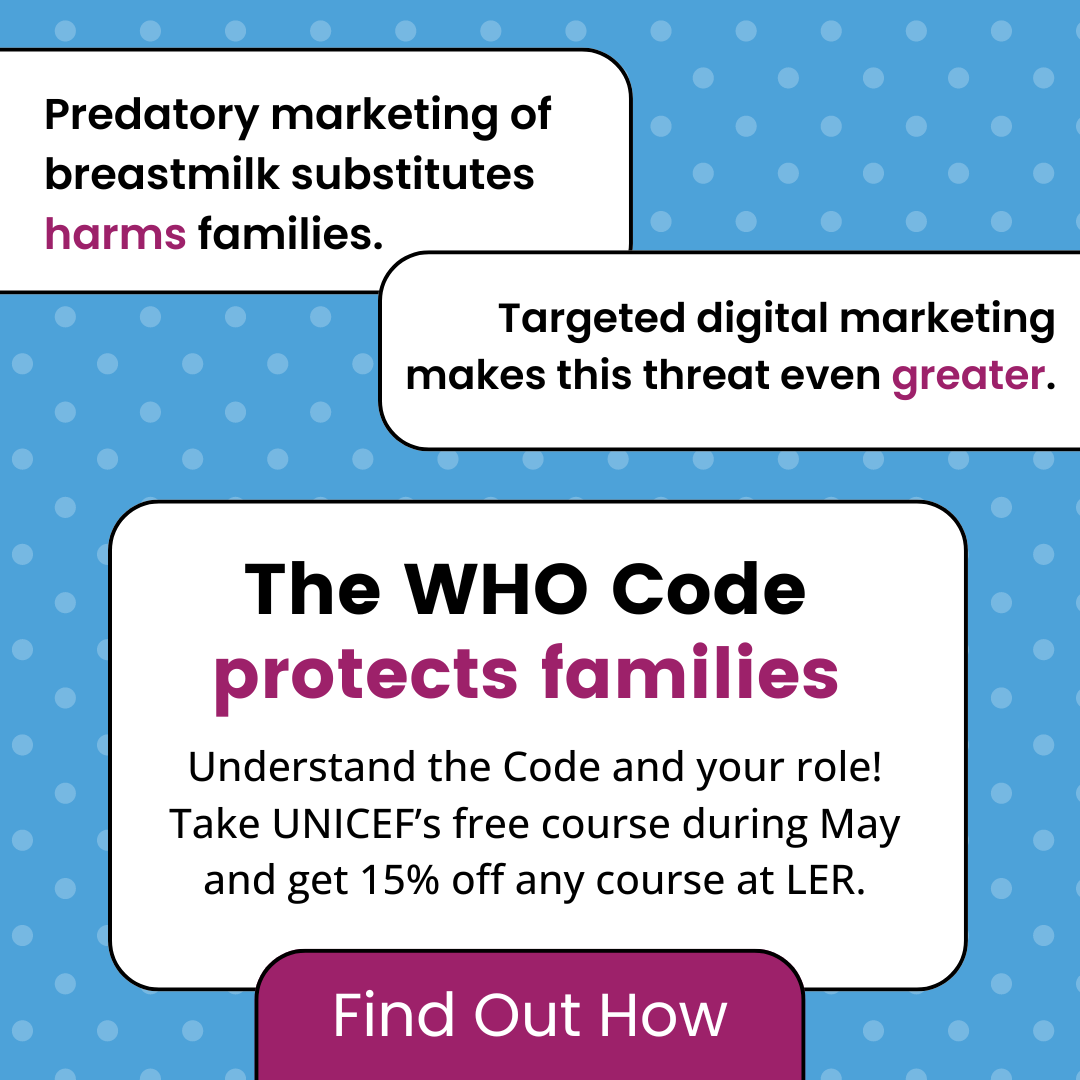Goals 2021: Clinical Hours—Your Questions Answered

Welcome back to Goals 2021, a blog series designed to help you make sure this year finds you closer to being an IBCLC!
So far, we’ve talked about making a long term plan and ways to complete your Health Science Education requirements.
For the entire series, we talk with Angela Love-Zaranka, BA, IBCLC, RLC, Program Director at Lactation Education Resources (LER). Love-Zaranka served on the IBLCE Board from 2006 to 2012 and sat on IBLCE committees until 2015.
Next, let’s tackle getting your clinical hours.
Getting Clinical
Before applying to sit the IBLCE exam, candidates must meet requirements in three broad categories.
They must complete health science coursework, breast-feeding specific education, and clinical hours.
Let’s dig into the clinical hours requirement.
How many hours do I need?
The exact requirements for clinical hours depend on which pathway to certification you are pursuing.
Pathway One requires 1,000 hours of lactation-specific clinical practice in an approved setting within five years prior to the exam application.
Some candidates on Pathway One are employed by hospitals, birth centers, clinics, primary care offices, and more, and get their hours through their employment.
Others on Pathway One obtain their hours by serving as volunteer lactation support counselors with IBLCE-recognized volunteer organizations.
Hours have historically been awarded on a flat-rate basis when earned this way (applicants received a certain number of hours for each year they served with the volunteer organization). However, beginning in 2022, hours must be documented and calculated. (For more information, including a list of IBLCE-recognized volunteer organizations, visit the IBLCE site here.
Pathway Two (attending an academic program) requires 300 hours of lactation-specific clinical practice within five years before the exam application, directly supervised by a currently certified IBCLC.
Pathway Three (a formal mentorship route) requires 500 hours of directly supervised clinical practice within five years prior to the exam application, under a currently supervised (and pre-approved) IBCLC mentor.
Why is it important?
You may have breastfed or chestfed, and you’re going to complete 90 hours of breastfeeding-specific education. So why are the clinical hours necessary?
According to Love-Zaranka, it’s all about exposure and experience. Seeing more lactating parents and more babies begins to train your ability to assess.
“The more people you help, the better you are able to discern what’s normal and what’s abnormal,” she explains. “The better able you are to discern what’s typical and what’s atypical.”
It also helps you begin to learn when you can help and when you need to refer.
“For me, during my clinical hours is where I learned to discern, ‘Okay, I can help this person,’ versus ‘I need additional support here. I need an IBCLC or a provider or somebody else,’” Love-Zaranka says.
When should I start?
If you’re just getting going and need to pick an initial goal, Love-Zaranka suggests starting with breastfeeding-specific education, before focusing on clinical hours.
It’s helpful to have some didactic learning under your belt before you start helping families, she explains—it provides a foundation for your work, and it may expand your options for placement.
This might look like starting a 90-hour course and completing some of it, taking a 45-hour course, or finding online courses to tackle some of the most basic topics on the IBLCE’s Detailed Content Outline (like latch, positioning, and anatomy and physiology).
“And then, as you’re continuing to work on your breastfeeding-specific education, start looking around for where you can serve,” she says.
Where can I get my hours?
This answer depends in large part on which pathway you choose.
Several settings, from peer-to-peer volunteer organizations to clinics and hospitals, are acceptable.
Love-Zaranka recommends taking stock of what is available in your own community. Are there peer organizations operating that you can contact, such as La Leche League or WIC?
“If you have human milk fed yourself, peer counseling might be a good option,” she says.
If a peer support setting isn’t available to you, an internship might be a good fit. Learn more about what LER has to offer here.
And don’t discount virtual opportunities to get clinical hours—many exist, especially now.
What if my job counts?
Some exam candidates find themselves working in a field where their contact with lactating families can serve as their clinical hours.
Love-Zaranka makes one key suggestion for this circumstance: Get a mentor.
“Even if you are not required to have to have one-on-one supervision of your hours, find a mentor anyway,” she says. “It’s one of the best things you can do, regardless of what pathway you take to become an IBCLC.”
“It will make the experience so much richer,” she continues. “And sooner or later, something is going to come up where you’re going to be so glad you have someone to turn to to help you.”
How do I document my hours?
Your hours are important—you definitely want to get credit for them! So it’s key to take careful notes.
“If you spend one hour with a client, you need to document that. If you spend 3 hours with a client, you need to document that,” Love-Zaranka says. “Briefly note what the issue was and what you did.”
“It’s easier to document when you’re doing it than to try to do it backwards,” she continues. “I have seen it too many times where someone is questioning whether they got their hours. If you have it documented, it covers you.”
Documentation doesn’t have to be fancy. Love-Zaranka says simply using a paper calendar and logging hours under each day is enough.
“Just document your hours—every last one of them. Yes, it’s a pain. Yes, it’s annoying. But document those hours, and if you’re keeping an electronic version, back it up!”

Welcome back to Goals 2021, a blog series designed to help you make sure this year finds you closer to being an IBCLC!
So far, we’ve talked about making a long term plan and ways to complete your Health Science Education requirements.
For the entire series, we talk with Angela Love-Zaranka, BA, IBCLC, RLC, Program Director at Lactation Education Resources (LER). Love-Zaranka served on the IBLCE Board from 2006 to 2012 and sat on IBLCE committees until 2015.
Next, let’s tackle getting your clinical hours.
Getting Clinical
Before applying to sit the IBLCE exam, candidates must meet requirements in three broad categories.
They must complete health science coursework, breast-feeding specific education, and clinical hours.
Let’s dig into the clinical hours requirement.
How many hours do I need?
The exact requirements for clinical hours depend on which pathway to certification you are pursuing.
Pathway One requires 1,000 hours of lactation-specific clinical practice in an approved setting within five years prior to the exam application.
Some candidates on Pathway One are employed by hospitals, birth centers, clinics, primary care offices, and more, and get their hours through their employment.
Others on Pathway One obtain their hours by serving as volunteer lactation support counselors with IBLCE-recognized volunteer organizations.
Hours have historically been awarded on a flat-rate basis when earned this way (applicants received a certain number of hours for each year they served with the volunteer organization). However, beginning in 2022, hours must be documented and calculated. (For more information, including a list of IBLCE-recognized volunteer organizations, visit the IBLCE site here.
Pathway Two (attending an academic program) requires 300 hours of lactation-specific clinical practice within five years before the exam application, directly supervised by a currently certified IBCLC.
Pathway Three (a formal mentorship route) requires 500 hours of directly supervised clinical practice within five years prior to the exam application, under a currently supervised (and pre-approved) IBCLC mentor.
Why is it important?
You may have breastfed or chestfed, and you’re going to complete 90 hours of breastfeeding-specific education. So why are the clinical hours necessary?
According to Love-Zaranka, it’s all about exposure and experience. Seeing more lactating parents and more babies begins to train your ability to assess.
“The more people you help, the better you are able to discern what’s normal and what’s abnormal,” she explains. “The better able you are to discern what’s typical and what’s atypical.”
It also helps you begin to learn when you can help and when you need to refer.
“For me, during my clinical hours is where I learned to discern, ‘Okay, I can help this person,’ versus ‘I need additional support here. I need an IBCLC or a provider or somebody else,’” Love-Zaranka says.
When should I start?
If you’re just getting going and need to pick an initial goal, Love-Zaranka suggests starting with breastfeeding-specific education, before focusing on clinical hours.
It’s helpful to have some didactic learning under your belt before you start helping families, she explains—it provides a foundation for your work, and it may expand your options for placement.
This might look like starting a 90-hour course and completing some of it, taking a 45-hour course, or finding online courses to tackle some of the most basic topics on the IBLCE’s Detailed Content Outline (like latch, positioning, and anatomy and physiology).
“And then, as you’re continuing to work on your breastfeeding-specific education, start looking around for where you can serve,” she says.
Where can I get my hours?
This answer depends in large part on which pathway you choose.
Several settings, from peer-to-peer volunteer organizations to clinics and hospitals, are acceptable.
Love-Zaranka recommends taking stock of what is available in your own community. Are there peer organizations operating that you can contact, such as La Leche League or WIC?
“If you have human milk fed yourself, peer counseling might be a good option,” she says.
If a peer support setting isn’t available to you, an internship might be a good fit. Learn more about what LER has to offer here.
And don’t discount virtual opportunities to get clinical hours—many exist, especially now.
What if my job counts?
Some exam candidates find themselves working in a field where their contact with lactating families can serve as their clinical hours.
Love-Zaranka makes one key suggestion for this circumstance: Get a mentor.
“Even if you are not required to have to have one-on-one supervision of your hours, find a mentor anyway,” she says. “It’s one of the best things you can do, regardless of what pathway you take to become an IBCLC.”
“It will make the experience so much richer,” she continues. “And sooner or later, something is going to come up where you’re going to be so glad you have someone to turn to to help you.”
How do I document my hours?
Your hours are important—you definitely want to get credit for them! So it’s key to take careful notes.
“If you spend one hour with a client, you need to document that. If you spend 3 hours with a client, you need to document that,” Love-Zaranka says. “Briefly note what the issue was and what you did.”
“It’s easier to document when you’re doing it than to try to do it backwards,” she continues. “I have seen it too many times where someone is questioning whether they got their hours. If you have it documented, it covers you.”
Documentation doesn’t have to be fancy. Love-Zaranka says simply using a paper calendar and logging hours under each day is enough.
“Just document your hours—every last one of them. Yes, it’s a pain. Yes, it’s annoying. But document those hours, and if you’re keeping an electronic version, back it up!”
By accepting you will be accessing a service provided by a third-party external to https://www.lactationtraining.com/

